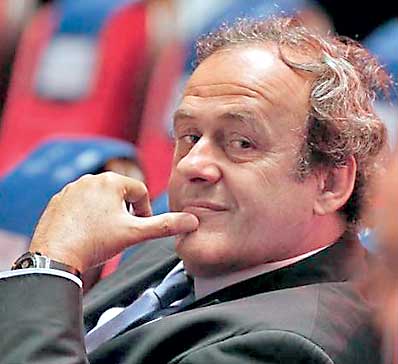Sunday Dec 14, 2025
Sunday Dec 14, 2025
Wednesday, 30 September 2015 00:00 - - {{hitsCtrl.values.hits}}
REUTERS: Bookmakers have lengthened the odds that European soccer boss Michel Platini will succeed Sepp Blatter as head of the sport’s global governing body FIFA, after Swiss prosecutors said they were investigating Blatter over a payment to Platini.
Blatter, head of FIFA since 1998, is due to step down in February as U.S. and Swiss authorities investigate alleged corruption at the organisation in a scandal that has rocked the sport and upset its commercial sponsors.
Platini, a former French midfielder and head of European soccer body UEFA since 2007, had been odds-on favourite to be elected to succeed Blatter, meaning he was seen as likelier to get the job than not.
However, bookmaker William Hill said it had lengthened its odds on Platini getting the job to 11/10 from 1/3. Instead of being three times as likely to become FIFA president as not, Platini was now likelier than not to lose out.
“He is no longer odds-on favourite,” said William Hill spokesman Joe Crilly.
According to Ladbrokes, another British bookmaker, the new odds-on favourite is Prince Ali Bin Al Hussein, brother of Jordan’s King Abdullah.
Ladbrokes was now quoting him at 4/7, suggesting a 64% chance that Prince Ali will win the job, up from just a 25% chance last week.
Alex Donohue of Ladbrokes said: “The odds have moved decisively in favour of Al Hussein. Platini now looks increasingly less likely to win the presidential race.”
Platini has the strong support of a number of national soccer associations, especially in Europe. However, if he himself were to become the target of an investigation by FIFA’s ethics body, he could be suspended, making it impossible to stand.
FIFA was thrown into fresh turmoil on Friday when the Swiss attorney general’s office (OAG) opened criminal proceedings against Blatter, who was questioned at his federation’s headquarters, on suspicion of criminal mismanagement.
The OAG said Blatter, who has been FIFA president since 1998, was suspected of making a “disloyal payment” of 2 million Swiss francs ($2.04 million) to Platini in 2011.
Platini was also questioned as a witness. UEFA, where he is now president, said the questions concerned a payment Platini received for work he did for FIFA on contract from 1999-2001.
Several media outlets have speculated that FIFA could launch its own investigation into Platini, Blatter or both, potentially resulting in a provisional suspension that might coincide with the election for a new FIFA boss.
A spokesman for FIFA’s chief ethics investigator Cornel Borbely would not comment on whether either man would become the target of an investigation, but said the committee had the power to investigate anyone in global soccer, regardless of position.
“If there is an initial suspicion, the Investigatory Chamber of the Ethics Committee initiates a formal proceedings. These rules apply to all people in football, regardless of their position or name.”
People who are placed under investigation may or may not be suspended, depending on the circumstances. Any request for a provisional suspension has to be approved by Hans-Joachim Eckert, a Munich-based judge who is responsible for deciding on sanctions when the FIFA ethics code is violated.
Candidates must formally submit their intention to stand for the FIFA presidency by Oct. 26, four months before the election. Provisional bans last for 90 days and are renewable for another 45, long enough to make Platini potentially miss the deadline.
If he stands for president, Platini must also face an integrity test conducted by Borbely’s committee.
When seven soccer officials and sports marketing executives were arrested in Zurich in May after being indicted in the United States on corruption charges, they were provisionally suspended by the ethics committee the same day.
However, as Blatter was not arrested or charged and Platini was only questioned as a witness, the cases are not as clear-cut for the ethics committee.